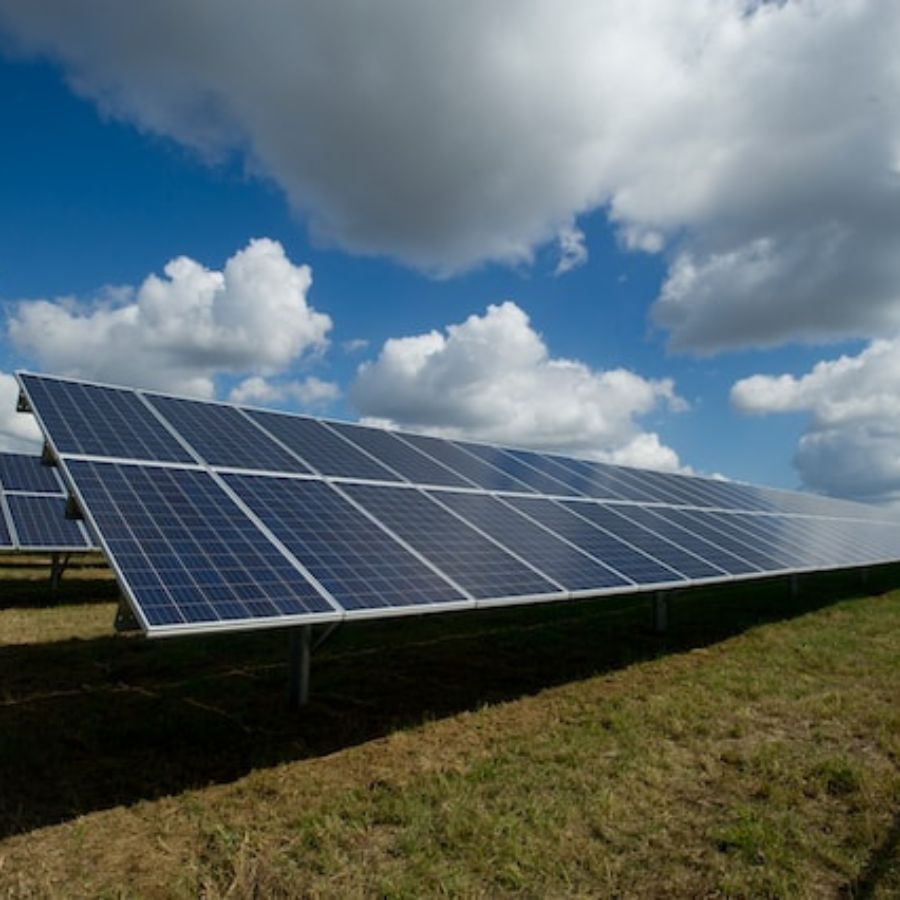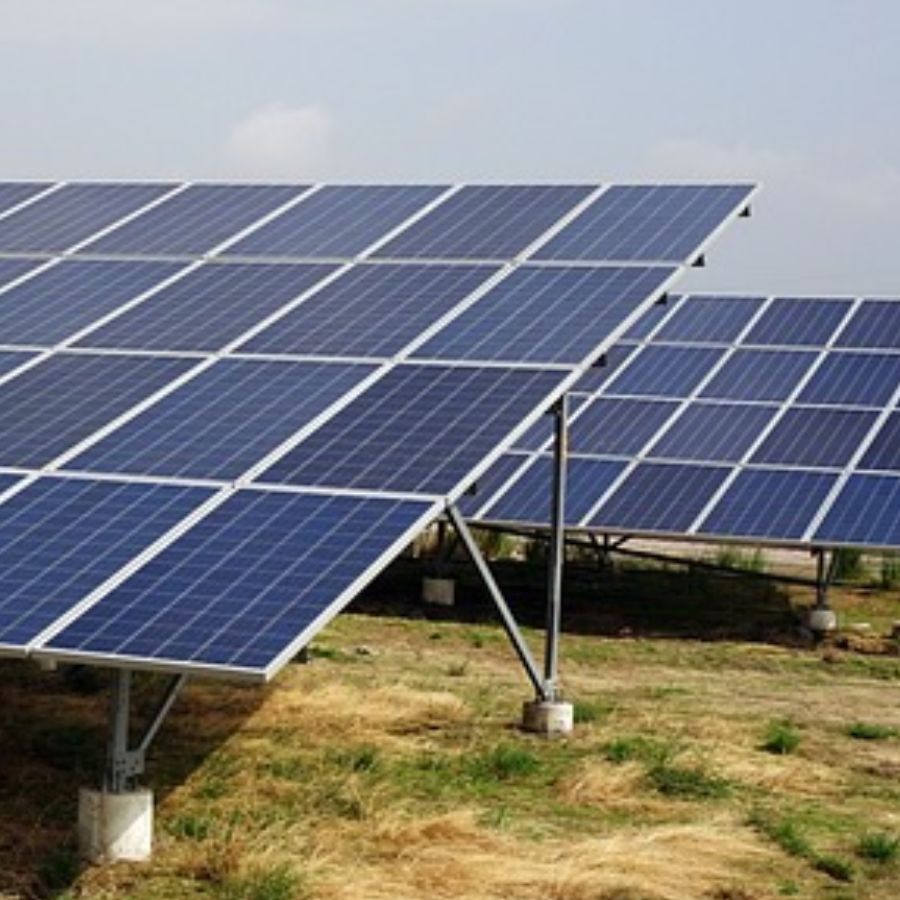Solar energy is a widely accepted and increasingly popular form of renewable energy worldwide. Here in British Columbia, Canada, many homeowners are considering alternative energy sources, and solar power is at the top of the list. This comprehensive guide will focus on ground-mounted solar panels. It is a popular and highly beneficial option in solar power systems.
What Are Ground-Mounted Solar Panels?
Ground-mounted solar panels are a type of solar energy system installed directly on the ground rather than attaching them to a building’s rooftop. They come in two main types: traditional ground-mounted systems and pole-mounted solar PV systems. Both types can be an excellent alternative for those who lack the necessary rooftop space or have a rooftop that doesn’t face the ideal direction for sunlight exposure.
Traditional Ground Mounted System
In a traditional ground-mounted system, the panels get support from a robust metal framing system, which often consists of aluminum or steel, securely anchored to the ground. Further, one can fix the mounts or make them adjustable, allowing the tilt angle of the solar panels to change for optimal sunlight exposure.
Pole-Mounted Solar Systems
In a pole-mounted solar system, each panel attaches to a single pole that can go directly into the ground or secure it with a concrete footing. Again, one can manually adjust or mechanize this ground-mounted solar system to track the sun’s path across the sky, maximizing solar energy production.
Why Choose Ground-Mounted Solar Panels?

The decision to invest in ground-mounted solar panels is a significant one. Moreover, to help you understand why it could be an excellent choice for your property, we delve deeper into the benefits of choosing ground-mounted solar systems. It is best to choose them over their rooftop counterparts.
The Flexibility of Installation
The most significant advantage of ground-mounted solar panels is their flexibility when it comes to installation. Unlike rooftop panels that are small in size, angle, and roof orientation, ground-mounted systems installation can be in any location. Given sufficient space and sunlight, one can install them in any location on a property. In addition, this flexibility allows homeowners to strategically position their solar panels in an area with maximum sun exposure. Further, that leads to an increase in efficiency and higher energy output.
Superior Energy Efficiency
Due to the installation flexibility, ground-mounted solar panels often outperform their rooftop counterparts regarding energy efficiency. One can orient and tilt them for optimal sun exposure, allowing maximum solar energy absorption throughout the day. Besides, this benefit is better in pole-mounted solar systems equipped with solar tracking mechanisms that follow the sun’s movement across the sky. They also optimize the system’s energy production.
Ease of Maintenance
Ground-mounted solar systems are easier to maintain compared to rooftop panels. Their ground-level placement ensures easy access to cleaning and maintenance tasks. Whether removing snow during the winter months or performing routine cleanings to remove dust and debris, these tasks are considerably more straightforward with ground-mounted panels. Moreover, they contribute to their long-term efficiency and durability.
Higher Capacity
For properties with ample open space, ground-mounted solar panels provide an opportunity to install a more extensive solar energy system. With more panels, you can generate more power, covering your energy needs. Again, you can even export surplus power back to the grid, depending on the policies and schemes available in BC, Canada.
Avoids Roof Damage
Installing rooftop solar panels involves drilling into the roof, which can cause leaks or other damages over time. Conversely, ground-mounted solar panels eliminate this risk, preserving the integrity of your home’s roof. Ground-mount solar panels are perfect for homes with roofs that are not ideal for solar panel installation. Some roofs may need to be more shady, have the wrong orientation, or be in a steep pitch to install solar panels. There could also be issues related to the structure or material of the roof. Ground-mount solar systems bypass these issues altogether.
Improved Aesthetics
While subjective, some homeowners may prefer the aesthetic of a ground-mounted solar panel system. Unlike rooftop panels, which can alter the appearance of your home, one can tuck away ground-mounted systems out of sight or integrate them into your landscaping design.
The ground-mounted solar panel system offers many benefits. Such benefits include:
- increased flexibility
- higher energy efficiency
- ease of maintenance
- higher capacity potential
- improved aesthetics
While the investment might be significant, the long-term savings, both financially and environmentally, make it an option worth considering for many BC homeowners.
Installation Process of Ground-Mounted Solar Panels
The installation of a ground-mounted solar panel involves several key steps:
1. Site Selection
A site with good sunlight exposure and minimal shading is essential for a productive solar power system.
2. Site Preparation
The area must be cleared and leveled before the installation.
3. Foundation Installation
Depending on the ground mount solar system chosen, a concrete foundation may be necessary, or ground screws may be used.
4. Mounting Frame Construction
The metal framing system, which will hold the solar panels, is assembled and installed onto the foundation.
5. Panel Installation
The solar panels are attached to the mounting frame and wired together to form a solar array.
6. System Connection
The solar array connects to an inverter, which converts the direct current (DC) electricity produced by the panels into alternating current (AC) power that one can use in the home.
Comparison With Rooftop Solar
While ground-mounted and rooftop solar have pros and cons, the choice largely depends on individual homeowners’ circumstances. Rooftop solar can be a space-saving option for those with smaller properties or those wanting to utilize their roof space. However, they may not be as efficient if the roof orientation is not ideal, and maintenance could be more challenging due to accessibility issues.
On the other hand, ground-mounted panels offer flexibility in placement, easy maintenance, and the potential for better performance. However, they require more space, and installation can be more invasive due to the necessary groundwork.
Conclusion
As we strive for cleaner, more sustainable energy sources, solar power systems, including ground-mounted solar panels, will likely become increasingly important. They offer an appealing combination of flexibility, efficiency, and environmental benefits. If you have the necessary space and are looking for a more accessible, high-performance alternative to rooftop panels, a ground-mounted solar system could be an excellent choice.
Whether you opt for traditional ground-mount panels or pole-mounted PV systems, both options can provide a reliable, renewable energy source. With British Columbia’s natural abundance of sunlight, it’s undoubtedly a resource worth harnessing. Consider this ultimate guide as your first step towards embracing the power of ground-mounted solar panels in BC, Canada.
Frequently Asked Questions
Can You DIY Install Ground-Mounted Solar Panels?
Yes, it is possible to install ground-mounted solar panels yourself. However, mounting solar panels, especially ground-mount systems, can be complex. It involves:
- careful site selection
- site preparation
- mounting structure installation
- securely attaching the solar panels
- wiring the system to your home’s electrical grid or a battery storage system
Furthermore, the process becomes even more intricate if you opt for a pole-mounted system due to the additional mechanical components involved.
While DIY projects can save on installation costs, hiring professionals for solar energy system installation is generally better. Installation mistakes can reduce system efficiency, potential damage, and safety risks. Moreover, professional installers have the necessary training and experience to ensure the system complies with local regulations and building codes.
Can You Get Incentives for Ground-Mounted Solar Panels?
In many regions, including British Columbia, incentives are available for installing solar panels, which applies to ground-mounted systems. Government incentives aim to promote the use of renewable energy and can take various forms, such as grants, tax credits, or feed-in tariffs for excess power generated.
These incentives are usually different from the type of solar installation. Hence, whether you’re installing rooftop installations or a ground-mounted system, you may be eligible for these benefits. However, the availability and value of incentives can vary, so it’s best to check the most current programs offered in BC.
Can You Use Ground-Mounted Solar Panels Off-Grid?
Ground-mounted solar panels can be a crucial off-grid solar power system component. An off-grid system is entirely independent of the primary electrical grid, which means it must generate and store all the electricity needed for the property. Besides, given their potential for high energy output and that space is less of a constraint when living off-grid, ground-mounted panels, and particularly pole-mounted systems, can be an excellent choice.
In an off-grid system, the power generated by the solar panels during the day is stored in a battery for use when the sun isn’t shining. Ground-mounted solar panels can be ideally oriented and tilted to maximize daily and seasonal solar energy production, making them an efficient choice for off-grid living.


Leave a Reply